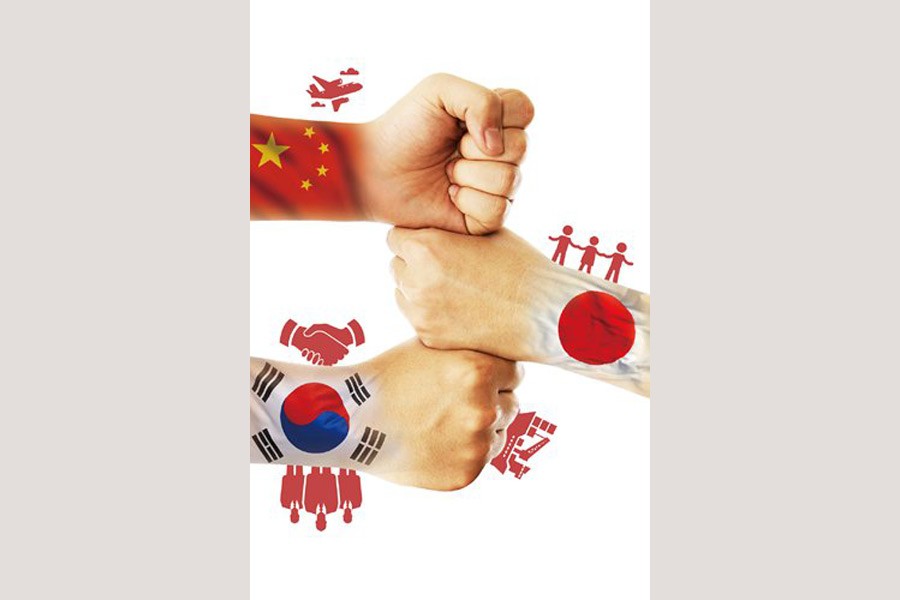
Published :
Updated :

Japanese Prime Minister Shinzo Abe's administration has adjusted its East Asia policy after securing the majority of seats in the House of Councillors, or the Upper House, in July.
To begin with, Japan and South Korea are going through the darkest hour in their relationship. The Japanese cabinet removed South Korea from its white list of trusted trading partners on August 2. In a tit-for-tat move, South Korea announced its plans on Monday to remove Japan from its "white list" of trusted trade partners from September. As a result, Tokyo-Seoul ties have reached their lowest point since diplomatic relations were established in 1965. Signs of improvement have yet to be seen.
The trade conflict involves only the two Northeast Asian countries, but the dispute has impacted the framework of regional security. Both Japan and South Korea are US allies and play key roles in US intervention in regional affairs. If Tokyo-Seoul disputes become a long-term issue, the US-Japan-South Korea alliance would be challenged and result in major security changes in the region.
Meanwhile, China-Japan ties have reached new levels. Chinese Vice Foreign Minister Le Yucheng and Japanese Vice Foreign Minister Takeo Akiba held a new round of strategic dialogue on Saturday. The two sides exchanged views on bilateral relations and international and regional issues of common concern.
Strategic dialogue is an essential channel for the two governments to strengthen strategic communication and is significant for the development of bilateral ties. The discussions resumed after seven years, indicating Beijing-Tokyo relations are improving.
The changes are not accidental, but a stark reflection of the Abe administration's East Asia policy.
Chinese Premier Li Keqiang visited Japan in May 2018. The visit was followed by Abe's official visit to China in October 2018. Japan-China High-Level Economic Dialogue resumed in April 2019 and the two countries' strategic dialogue resumed in August. The moves indicate joint efforts aimed at strengthening mutual trust. Japan is likely to maintain positive policies toward China, which will help shape a new East Asian order.
In the meantime, sluggish Japan-South Korea relations will be a feature of the new East Asian order. The bilateral relationship nosedived due to historical issues and new trade disputes.
The Abe administration omitted the phrase "South Korea is our most important neighbor" in the Diplomatic Bluebook 2018, and this year it deleted the expression that Tokyo-Seoul relations should be developed "in a forward-looking direction." The Japanese government will "lower South Korea's standing as an important security cooperation partner" in an upcoming defense white paper set to be released next month, reported The Japan Times.
The subtle moves from Tokyo underscore a feature of Japan's policy toward South Korea - neglecting South Korea. It is estimated that this will be the tone of Japan's South Korea policy in the coming years.
Against the backdrop, whether the China-Japan-South Korea Free Trade Agreement can be reached has come into focus. This year marks the 20th anniversary of the cooperation between China, Japan, and South Korea. Trilateral cooperation and exchanges in economy, trade, culture, education, and disaster management have yielded fruitful results in the past two decades.
The trilateral cooperation mechanism has been continuously strengthened and a comprehensive and multilevel system is in place. In this context, if established, the China-Japan-South Korea free trade zone would help build an economic circle with 1.5 billion consumers, a total GDP of about $21 trillion, accounting for 20 per cent of the world GDP. This will greatly invigorate the global economy.
Unfortunately, the reality is that the agreement has yet to be realised due to historical, territorial issues among the three nations and interference from countries beyond the region.
The rise of global trade protectionism is supposed to be a vital push to accelerate the free trade agreement, but as Japan-South Korea relations continue to decline, negotiations will remain hindered. It is unlikely an agreement will be reached in the short term. The geopolitical changes in East Asia can only play a limited role in promoting the process.
Is South Korea willing to expand trade ties with Japan after being sanctioned by the latter? The three countries needs a solid trilateral economic and trade relationship.


 For all latest news, follow The Financial Express Google News channel.
For all latest news, follow The Financial Express Google News channel.